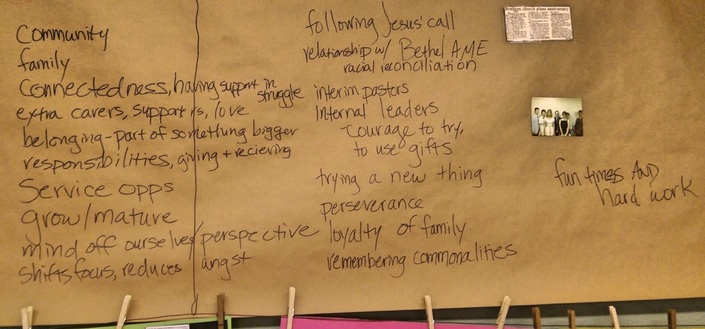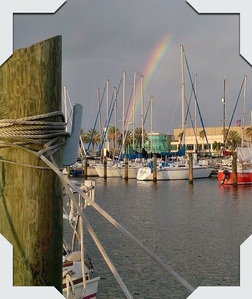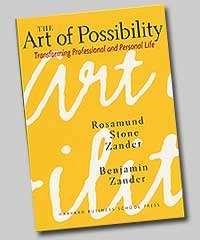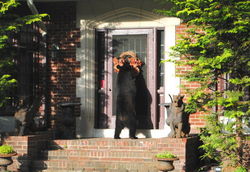 Sermon snippets: John 6:13-14 "...The brown paper up here is flimsy, but it’s holding our stories. The stories we share and the brown paper in our minds that stretches back thousands of years and forward for uncountable years are sturdy. They are powerful. They are why we are here. Sure, we’re here because someone asked us to be here, to show up early, to bring lunch, but why we are here is that we have a faith that stretches back thousands of years, and will live on thousands of years. That’s the miracle. The fish and the crust of bread become a meal. The miracle in the feeding of the multitudes is that everyone pitches in – their fish, their bread – and today we all pitch in, our stories. It takes more than a fish here and a crust of bread there, a story here and a photo there. And at the same time, all it takes is the fish and the bread, the stories and the photos – that’s all we need. All it takes is each of us pitching in with utter trust that our God of abundance works miracles through our sharing, works miracles through our trust, and we have a meal. It is when we open up our hands and give all we have that all are fed. So we can cling to our stories and our photos and our wishes that the church would be different. We can cling to our worries that we don’t have enough – that we don’t have enough people, we don’t have enough energy, we don’t have enough money, we don’t have enough vision. And then we don’t have enough. It only works when we open our hands wide, hold nothing back, trust completely and let God work a miracle. Through our trust we have a meal. All are fed. And there are twelve baskets leftover. Because it’s not just for us that we do this, it’s not just for those of us in this room that we gather and break bread and share fish and stories. It’s for the world around us. Those 12 extra baskets are needed outside of these doors...."
2 Comments
 What could our post-split covenant be to one another? What could our post-split covenant be to one another? After four years away from Church of the Brethren drama and Annual Conference, I enthusiastically and optimistically attended this year's conference. It was fantastic and frustrating, hopeful and horrible, spirited and shallow. Basically, it was human. I'm glad I went. My friend Nate and I disagree on all the hot topics, and have meaningful conversation over and over. After conference we walked along Tampa Bay and wondered about the future of the church. I don't believe we're created or called to design perfect institutions. When reforming institutions keeps us from serving, loving and experiencing joy, year after year, I believe one faithful way forward is to go separate ways. Not the only faithful way forward, but one valid option. If the Church of the Brethren wasn't a peace church, I bet we would have split already (this time around). But we have a reconciling identity to uphold! We're leaking energy because we've lost trust in one another, and Annual Conference is a chance to stake claims and check boxes and assume the worst. As I'm learning in my personal life, trusting someone else is only possible if I trust myself. As I contemplate this dynamic personally and organizationally (ecclesiastically?) I wonder if trusting others even matters. We can't predict or prepare for what others will say or do (in our personal lives or churches or jobs) but we can settle into our own selves, define our boundaries, and tend to our anxiety and disappointment along the way. That's what it means (to me, right now) to trust ourselves. And then we're ready for any situation. If we trusted ourselves more in the church, we'd spend more time enjoying one another and growing in our faith and service. We'd spend less time arguing or defending or hunting heresy. Would a church split help us trust ourselves more, or would it weaken our trust?  Sermon snippets: Ephesians 2:8-10 "...Getting an A from the start is grace. What fears could we release if we had the gift of getting an A? Of knowing that the one who walks alongside us through this life has given us an A, has created us and called us “good,” has delighted in the fullness of who we are? “If you knew Who walks beside you on the way that you have chosen, fear would be impossible,” wrote Helen Schulman. Maybe the One walking beside you is God. Maybe you call on the name of Jesus. Maybe the spirit of an ancestor or a guardian angel journeys with you. Maybe the One walking beside you is a living person who loves you unconditionally, truly, who loves you with absolute grace. It’s all God, we just have different ways of finding God at our side. “If you know Who walks beside you on the way that you have chosen, fear is impossible.” Paul understood that One to be God, revealed in Jesus. He wrote “It is by grace that you have been saved, through faith--and even that is not of yourselves, but the gift of God. Nor is it a reward for anything that you have done, so nobody can claim the credit. We are God’s work of art, created in Christ Jesus to do the good things God created us to do from the beginning.” It’s like getting an A, from the beginning of the class, not as a reward for something we have done, but because we are Divinely created works of art. Our very nature and being get an A. The gift of grace, of getting an A, is a paradox. Just like the students in Ben’s class, when we know we have an A we have the confidence and creativity to beam our A selves into this world. As Ben’s students imagined and put to paper the details of their own beaming – as musicians, students and people – they invited their own glory into the world...." Who or what has been the Ben in your life? Who has given you permission to see yourself as excellent? Who urges you to believe in your own worth? For many people, God is the giver of grace, the unconditional lover. The irony is that we’ve also turned God into the ultimate judge, the ruthless punisher, the One to fear. We gather here to resist dangerous and damaging theology. We gather here to cultivate the witness and wisdom of liberation and healing. As we seek to love ourselves and one another as best we can, let us celebrate a loving God who delights in our beings, who lavishes us with As, who graces us because we are worthy, not because we earn it. We are wholly beloved without lifting a finger, uttering a word, or making a choice. And the story doesn’t end there. Just like Ben’s students joyfully do excellent, A-level work in the musical performance class, we respond to God’s grace by becoming the best of ourselves. We get grace even when we aren’t our best, but our natural response is to be what we’re expected to be, to meet our own expectations and others’ expectations of us. |
Archives
January 2022
|



 RSS Feed
RSS Feed